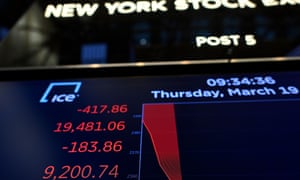e
Coronavirus credit crunch could make 2008 look like 'child's play'
Experts warn companies that have gorged on cheap money for the past decade face going out of business
 Ratings agency Moody’s has said the virus was an ‘unprecedented’ shock to the system Photograph: Johannes Eisele/AFP via Getty Images
Ratings agency Moody’s has said the virus was an ‘unprecedented’ shock to the system Photograph: Johannes Eisele/AFP via Getty ImagesMartin Farrer
Fri 20 Mar 2020
A worldwide credit crunch triggered by the coronavirus will set in motion a wave of corporate bankruptcies that will make the global financial crisis look like “child’s play”, investors have warned.
With the world’s most advanced economies all entering a shutdown that could last months, companies that have gorged on cheap money for the past decade face going out of business thanks to a huge spike in borrowing costs on international money markets.
The sudden loss of revenue faced by airlines, tourism-related businesses and carmakers make them extremely vulnerable, ratings agencies have said, with parts of the energy sector also at risk as the fall in the oil price to an 18-year low pulls the rug from under its feet.
The problems were underlined on Thursday when Australia’s national carrier, Qantas, cancelled all international flights and furloughed 20,000 staff. Dozens of companies in Europe and the US have issued profit warnings as they prepare for a massive hit to revenues. The financial position of the UK’s North Sea oil and gas industry was “paper-thin”. Currencies such as UK sterling and the Australian dollar were hammered as the clamour for safety sucked money into US dollar holdings.
US treasury secretary Steve Mnuchin said unemployment could rise to 20% in America in what the ratings agency Moody’s said was an “unprecedented” shock to the system. S&P warned this week that these factors would lead to a “surge” in corporate bankruptcies.
Angus Coote, of Jamieson Coote Bonds in Melbourne, said the crisis could soon explode the massive debt bubble inflated by years of low interest rates and cheap money.
‘These are truly extraordinary times,” he said, “and it’s quite sobering. I’ve been in the business for 25 years and this makes the GFC [global financial crisis] look like child’s play.”
The problem was particularly acute in the corporate borrowing market, he said, where many companies will struggle to refinance debt due to a repeat of the sudden change in credit conditions that sparked the 2007 credit crunch, banking collapses and then the GFC. The prospect of no revenue for months meant creditworthiness had plummeted in exposed sectors and cut off access to funding.
“It was OK for companies to build up debt and keep rolling it over when borrowing costs were low,” Coote told the Guardian. “But now the market is not trading at all and companies trying to roll over bonds face higher costs and the result will be bankruptcy events.
“$2tn worth of corporate debt is due to be rolled over this year but the market has completely frozen. The market is essentially closed. It’s a disaster.”
In the UK on Wednesday, managers of several large property funds banned investors from withdrawing their money. In a sign the crisis could spread through all types of assets, they said the coronavirus crisis had made it impossible to value the buildings they own.
The US-based Vanguard investment group told clients on Wednesday it had been forced to hike its fees for anyone who wanted to withdraw their money from investments known as exchange traded funds (ETFs), blaming a “significant” rise in trading costs. There is an estimated $6.4tn in ETFs around the world.
Lindsay David, of independent consultancy LF Economics, said the coronavirus shutdown had exposed longstanding imbalances in the financial system that had been disguised by more than a decade of ultra-low interest rates and trillions of dollars from quantitative easing schemes in the major economies.
“We know everyone is overleveraged, full bore, full risk,” he said. “All we were waiting for was a trigger and unfortunately that has come in the form of a health crisis.”
Both he and Coote cited the example of the Australian airline Virgin Australia, which has seen its market value more than halve this year to $500m while still saddled with $5bn of debt, which it will need to roll over. “No one in their right mind is going to lend Virgin Australia money,” Coote said.
The situation could be repeated across the world with the US shale oil industry seen as one of the highest-risk sectors after a rapid expansion fuelled by easy credit. S&P Global Ratings’ head of research, Alexandra Dimitrijevic, said tightening credit “will likely result in a surge in defaults, with a default rate on non-financial corporates in the US that may rise above 10% and into the high single digits in Europe over the next 12 months”.
Banks are also in jeopardy, according to David, and could soon require the kind of bailout packages that saved them in the GFC and which are now looking certain to be rolled out for airlines, carmakers and a whole range of other sectors.
A full repeat of the post-Lehman Brothers crisis was on the cards, he said, as banks scrambled to hold on to liquidity.
“Let’s say you are a pension fund in Canada and six years ago you gave a bank $1bn. Every year you roll over that bond and the deal remains in place. But now you’re saying, ‘you know what, can I have that money back now?’.”
“So the problem for the company is, where will I find $1bn? Not from its deposits or its liquidity because it’s now got more money going out than coming in.”
Geen opmerkingen:
Een reactie posten
Opmerking: Alleen leden van deze blog kunnen een reactie posten.